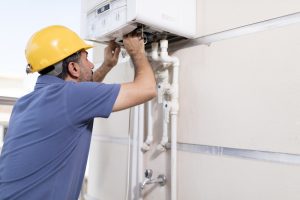When it comes time to choose a new heating system for your home, there is a good chance your choices are limited. Most homes already have either forced air or radiant heat equipment installed so choosing something different would be costly and unnecessary. But, if you have a choice or are moving into a new home, here are some things to consider regarding the difference between furnaces and boilers.
What a Furnace Does
A furnace uses a fuel like gas, oil or electricity to heat a series of coils in the device. The furnace then uses a blower to push air across the heated coil and into an air handler where it can be distributed throughout your home. This is called a forced air system and requires a combination of ducts and filters to keep air moving smoothly and cleanly throughout your home.
If you have access to gas, a gas furnace with an AFUE of 90% or higher is one of the most efficient and cost effective ways to heat your home. These furnaces can also last upwards of 20-25 years with proper maintenance.
What a Boiler Does
A boiler is different in that it uses water as the heat carrying medium, not air. Boilers still need gas, oil or electricity to heat up the water in the system, though they often use less of it than a traditional furnace – depending on the age of the furnace and the boiler. After water is heated in the boiler, your radiant heating system carries the water to baseboard heaters or radiators throughout your home. This form of heat is preferred by many because it doesn’t require ductwork (which requires extra maintenance) or extra air filtering and it is more humidity friendly in a large home.
In terms of efficiency, both boilers and furnaces are efficient if you’re buying a new model. Capacity is also evenly matched. Boilers take the edge in comfort level and if you have the budget, you can install radiant floor heating which allows you to pipe hot water directly into bathroom floors or your living space so that you never again need to walk on cold floors. Another benefit of radiant heating is that the system will hold heat much longer and then release it over time instead of turning on and off a lot as a furnace tends to do.
 It is always nice to be able to walk through your door and into a comfortably temperate home after a day spent trying to get away from the cold. If you could give your boiler a thank-you card, you might consider doing it.
It is always nice to be able to walk through your door and into a comfortably temperate home after a day spent trying to get away from the cold. If you could give your boiler a thank-you card, you might consider doing it.
Join Us Online